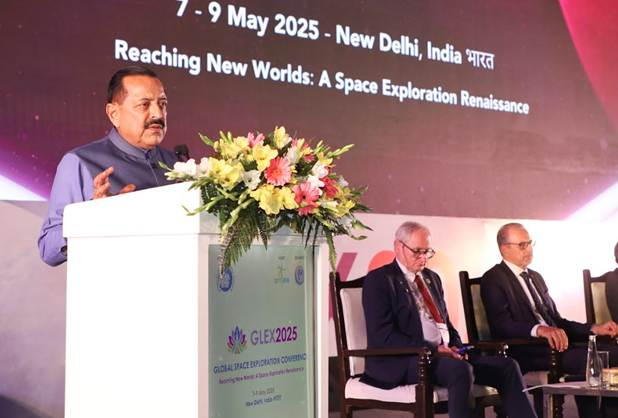GLEX 2025: India Declares Itself a Global Equal in Space Exploration
Dr. Singh described GLEX 2025 as a vital step in fulfilling India’s dual space vision — “A for Bharat” and “B for the World.”

- Country:
- India
India has reaffirmed its position as a rising star in the global space sector, with the successful hosting of the Global Space Exploration Conference (GLEX) 2025 at the iconic Bharat Mandapam in New Delhi. The prestigious three-day summit, themed “Reaching New Worlds: A Space Exploration Renaissance,” drew participation from over 35 nations and a host of international space agencies, making it one of the most significant space diplomacy events in recent history.
Held under the joint aegis of the International Astronautical Federation (IAF), the Indian Space Research Organization (ISRO), and the Astronautical Society of India (ASI), the event featured an array of activities—ranging from high-level deliberations to student engagements—that underscored India’s deepening commitment to advancing space science, innovation, and collaboration.
India’s Space Diplomacy Comes of Age
The conference was inaugurated by Union Minister of State (Independent Charge) for Science and Technology; Earth Sciences; and Minister of State for the Prime Minister’s Office, Department of Atomic Energy, Department of Space, Personnel, Public Grievances, and Pensions, Dr. Jitendra Singh. In his keynote speech, Dr. Singh declared that India had graduated from being a follower in the space arena to becoming a global enabler.
“India is now collaborating as an equal partner with the world’s leading space powers,” he stated. “This transition is a testimony to our scientific capability, visionary leadership, and commitment to peaceful space cooperation.”
Dr. Singh described GLEX 2025 as a vital step in fulfilling India’s dual space vision — “A for Bharat” and “B for the World.” He explained that while India’s space initiatives aim to meet national developmental goals, they are equally aligned with global aspirations, embracing the spirit of Vishwa Bandhu Bharat — a trusted and equal partner in international cooperation.
A Showcase of India’s Space Startup Ecosystem
A major highlight of the summit was the inauguration of a space technology exhibition by Dr. Singh, which featured 22 vibrant stalls. These represented a mix of Indian space startups, ISRO’s groundbreaking missions, and displays by global space agencies. The exhibition offered a window into India’s thriving private space industry, a sector that has seen exponential growth since the government opened it up to private players.
“In just two years, over 190 space startups have emerged across India,” Dr. Singh noted. “This growth is a reflection of our commitment to democratize access to space and unleash entrepreneurial energy.” He emphasized that private-public partnerships will be critical to future advancements in satellite launches, commercial payload deliveries, and deep space exploration.
Technical Excellence Across Thematic Areas
GLEX 2025 featured more than 240 interactive presentations across 10 parallel technical sessions, covering 15 thematic areas — from planetary exploration, lunar missions, and satellite communication to space medicine, propulsion systems, and space sustainability. These sessions enabled in-depth exchange of knowledge and best practices among space professionals, researchers, and students.
Notably, ISRO Chairman V. Narayanan highlighted India’s ambition to further interplanetary research and make space technology more accessible for societal use. “India's space programme stands at the intersection of innovation and social responsibility,” he said, reaffirming ISRO’s long-term vision.
Global Voices and Astronaut Outreach
The international character of GLEX 2025 was enhanced by the presence of eminent global dignitaries, including:
-
Josef Aschbacher (Director General, European Space Agency)
-
Kazuyoshi Kawasaki (Japan’s Aerospace Agency)
-
Jill Smyth (NASA, USA)
-
Wu Weiren (Chief Designer of China’s Lunar Programme)
-
Salem Al Marri (Director General, UAE Space Agency)
In a move aimed at inspiring the next generation, the summit also launched an astronaut outreach initiative. Ten astronauts, including UAE’s Hazzaa AlMansoori, Türkiye’s Alper Gezeravci, USA/Spain’s Michael López-Alegría, and India’s own Rakesh Sharma and Angad Pratap, interacted with students and early-career professionals. The sessions included motivational talks, Q&A rounds, and discussions on space missions, adding a human touch to the scientific proceedings.
Gaganyaan and Beyond: India’s Space Roadmap
With the countdown underway for the Gaganyaan mission—India’s first human spaceflight—the country’s presence at GLEX 2025 signals readiness for a new era of exploration. The mission will not only be a technological milestone but also a symbol of India’s maturing capabilities as a responsible space power.
Future objectives include ambitious lunar and planetary explorations, expanded satellite services, and the strengthening of India's role in climate monitoring and disaster management through space-based assets.
A New Dawn for Space Exploration
GLEX 2025 has served as a monumental platform, positioning India as a hub for international cooperation and a beacon of hope for emerging space nations. The summit encapsulated India's journey — from launching sounding rockets in the 1960s to becoming a global leader shaping the future of space exploration with humility, innovation, and inclusivity.
Dr. Jitendra Singh aptly concluded, “We are not here to act as a Big Brother but as equal brothers, working together for the shared benefit of our planet and beyond.”










